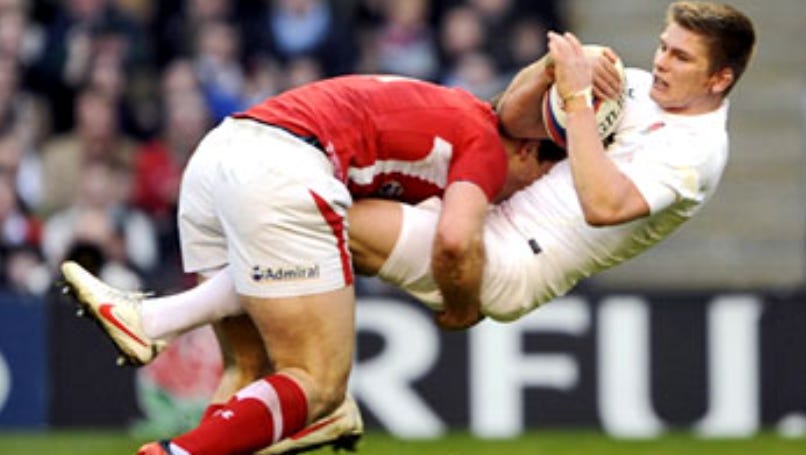You Can’t Negotiate If You’re Busy Being Liked
The psychology behind why being liked makes you weak at the negotiation table.
The Weekly Walkaway highlights negotiation in its ‘good’, ‘bad’ and sometimes ‘downright ugly’ forms. Issue No. 110 (18th April 2025)
Join our community of negotiators. Subscribe for free, click a like to support our work.
A Wake-Up Call
Hey Walkawayers.. Sorry this weeks Weekly Walkaway is little late but.. its holidays.. C’mon.. I know you forgive me, everyone needs a bit of a holiday.
And yes, let’s stop talking about Trump. I don't know about you but I’m bored of ‘it’.
It's like a bad Star Trek episode where the crew are slowly being consumed by a monster that feeds on their fear.. And just as they are all about to die they realise that it's their fear it needs, and so they start to laugh instead, and the monster shrinks and shrinks until… poooof.
Let’s talk recruiters, real ones. Not the deal-squeezing sharks that give us all a bad name, the second hand car sales; the ‘sure I can work at 8%’ types. No, no, I’m talking about recruiters who haven't needed to discount their value like a Black Friday sale and who, right now, need to negotiate like their mortgages depended on it.. because, well, they do. The monster.. remember.
C’mon guys you're not new to this game. You’ve been in recruitment long enough to know the buzz of winning a new client.. and the sting of losing one. You’ve felt sellers remorse when you realise you undercharged to win a tender and you’ve felt the jubilation of ringing that bell.
But right now it's getting tough and it's gonna get tougher so.. What you gonna do about it?
And this feeds into all service providers right now.. So listen up.
Short on time? Read this Ai Generated Summary
In today’s high-stakes recruitment world, being likeable is no longer enough and wanting to be liked can be fatal at the negotiation table.
This post explores the crucial difference between being likeable (a strength) and needing to be liked (a weakness), especially when recruiters move from relationship-building to deal-making. Using insights from Robert Cialdini’s Influence and Dale Carnegie’s How to Win Friends and Influence People, alongside Kahvay’s frontline negotiation experience, we break down the psychological traps recruiters fall into when facing well-trained Procurement teams.
Through the story of Jamie — a good recruiter caught in the “Friendly Recruiter Trap” — we reveal how approval-seeking behaviour leads to margin erosion, emotional manipulation, and lost leverage.
The post introduces Transactional Analysis (TA) to explain how recruiters unconsciously shift into a Child ego state when negotiating from a place of needing approval, while Procurement operates from the dominant Parent state — creating a power imbalance that consistently works against recruiters.
The takeaway?
👉 Likeability is useful in sales.
👉 Wanting to be liked will get you exploited in negotiation.
👉 Adult-to-Adult is the only state where real, respectful negotiation happens.
Walkaway Wisdom:
Being nice isn’t a strategy.
Procurement is trained — are you?
Lead the dance. Don’t be led.
You might think being likeable is your secret weapon as a recruiter. Spoiler: it isn’t — at least, not at the negotiating table. This week, I break down why your need to be liked could be the single biggest reason you’re leaving money, respect, and control on the table (and why Procurement is counting on you to keep doing it). If you’ve ever walked out of a negotiation feeling outplayed, underpaid, or just plain frustrated, you can’t afford to skip this one. Learn the science, the psychology, and the playbook that will help you break the “Friendly Recruiter” trap — before your competition does.
Read on for more…
We negotiate all of the time so it makes sense to get good at it. Invest in yourself.
Meet Jamie
A good recruiter, an even better human being. Friendly, trustworthy and goes the extra mile. You know the sort.. You may even be like her. And that is the problem..
You see, Jamie, like so many recruiters, confused being liked with negotiation leverage. So when Procurement came knocking, things got wobbly. Real wobbly.. The tone shifted, the pressure mounted and suddenly Jamie’s director level contact handed the conversation off to someone who didn’t care how lovely Jamie was. Welcome to the real negotiation. Let the games begin!
“Our negotiations were highly emotional. They made us feel we were at war”.
“When we first started the Kahvay training, it was a shocking moment. Because at our company, we’re all nice and friendly”.
Sound familiar?
Jamie was stuck in the ‘Friendly Recruiter’ trap; agreeable, wanting to be liked and constantly conceding whenever she was put under pressure by procurement.
What was the issue..?
Liking, Likeability, and the Friendly Recruiter Trap
It’s hard to admit, especially if your career has been built on relationships, but here it is:
If you want to be liked, you're gonna get exploited.
This isn’t about being rude. It’s about understanding the psychological levers that are used on you and how they work against you once you start negotiating.
The Science: Why Being Liked Works in Sales
Robert Cialdini’s classic Influence: The Psychology of Persuasion names liking as one of the six core principles of influence.
And I agree.
The research is clear: we say ‘yes’ more often to people we like. We’re more persuaded by those we feel are similar, friendly, or complimentary.
This gets you to the table.. THE NEGOTIATION TABLE. Because sales doesn’t agree deals.. Negotiation does.
Dale Carnegie’s How to Win Friends and Influence People built an entire movement around this: be interested, smile, use their name, make them feel important. Written in the darkest depths of The Great Depression, in the 1930’s.
And.. in selling, it works, I agree.
So right now, we all agree.
You all need to be selling more to clients you don't have, to get to the negotiation table.. and negotiating more with clients you do have.
We’ve said this before and we’ll say it again: Sales and Negotiation are different games with different rules. Use a set of rules in the wrong game and you’re gonna lose.
If everyone around you is playing rugby and you’re playing football you’re gonna get smashed! Simples.
We negotiate all of the time so it makes sense to get good at it. Invest in yourself.
Now, I’m not here to lecturer you on sales.. You can get that somewhere else but what I am passionate about is The Great Game of Negotiation.
But first what is the difference between being likable and wanting to be liked?
Being Likeable
You’re warm, confident, respectful, calm;
You listen well. You communicate clearly;
You’re professional and people enjoy working with you;
It’s how you show up. Likeability is a quality. A strength. Something you own. In sales, it builds rapport and in negotiation, it can help build trust and respect.
Wanting to Be Liked
You avoid tension. You seek approval. You say yes too quickly;
You downplay your value. You try to ‘not upset anyone’;
You let the fear of disapproval shape your decisions.
It’s how you’re driven. Wanting to be liked is a need. A vulnerability. Something that owns you. In sales, it makes you overly agreeable. In negotiation, it makes you exploitable.
Here’s the paradox:
You can be likeable without needing to be liked;
But if you want to be liked, you’ll trade away your value to get approval.
What do I mean..
Well, in sales, you want the buyer to like you. In negotiation, the moment you want them to like you? You’re done for!
That’s when you trade away your value to get that approval;
you’ll hesitate.. to push back and you won’t be a challenger;
you’ll not anchor high enough and leave money on the table for fear of being ‘unfair’;
you’ll feel their tactics and you will give into your emotions; your Lucy, the chimp in your head;
you’ll say ‘yes’ when you normally would say ‘no’;
you’ll say things and do things you wouldn't normally do and not walkaway when you should.
Why?
Simple; you're un-trained and deep down, you’re scared that being ‘a negotiator’ will make you unlikeable.
When you feel ‘liked’ you feel good, right?
So if someone makes you feel ‘unliked’ you don't feel good, right?
To make ‘you’ feel good you want to feel liked so you keep selling..
Can you see the physiology and the trap you’re in?!
If you don’t I guarantee ‘they’ do and they are using it against you.
It’s all linked to Transactional Analysis (TA), especially through the lens of the Parent–Adult–Child (PAC) model.
Wake up!
We negotiate all of the time so it makes sense to get good at it. Invest in yourself.
Likeability, Approval and Transactional Analysis
Lets quickly recap for all of you who may have missed previous posts on The Psychology of Negotiation.
We are all Parent, Adult and Child. We move between these ego states depending on changing circumstances.
Parent = authority, judgment, learned rules;
Adult = rational, calm, data-driven decision-making;
Child = emotional responses, blaming, explaining, insecurity and approval-seeking.
Being Likeable is an Adult Ego State
When you're authentic, grounded, clear, calm and professional you're operating from the Adult. You're able to build trust, be perceived as valuable and you're able to make rational decisions.
Wanting to Be Liked is a Child Ego State
This is where things start to go wrong, especially for recruiters who’ve built their careers on being friendly, nice and ‘liked’. They are driven by emotion based on how they’ll be perceived and a deep, often unconscious, need for approval.
Here are a couple of signs you’re in your ‘Child’ state:
You say ‘yes’ too early just to avoid friction (feeling uncomfortable) and you drop your fee to win favour, not because it makes commercial sense, but because it makes ‘you’ feel good;
You’re blaming external factors (‘the market’s tough’, ‘it’s a competitive process’, ‘our competition is cheaper’) to justify giving things away and you tell yourself, after, that you do it because you're being helpful, flexible, cooperative;
Over-explaining your value in the hope they’ll see your worth, instead of stating it confidently and you’re avoiding silence because it makes you uncomfortable.. so you fill the gap and talk yourself into a weaker position.
Procurement and tough clients love this version of you, because it's easy to pressure you and it's easy to unbalance you and therefore easy to exploit you.
If you want to be liked, you’ll be exploited.
Now Lets Take a Look at The Parent Ego State
The Parent is judgmental, rigid, rule making and enforcing and in negotiation, this is often where Procurement sits. They come armed with frameworks, policies and a tone that says ‘These are my rules..’.
The Parent reminds us of our Parents. They set the rules and would punish you if you broke them… and yes, they would reward you if you followed the rules. That's why the child in you is seeking the parents approval. Sad I know.. But it's true.
If you want the Parent to like you you slip right into your Child; approval-seeking.
That’s how the trap is set.
Now you’re thinking; ‘If I push back, they’ll disapprove and I’ll lose the deal. I need to be agreeable’.
Welcome to your Child.. And the Parent Child ego dynamics are skewed in the favour of The Parent. So the moment you want to be liked you now know that all you’re doing is seeking a Parents approval.
We negotiate all of the time so it makes sense to get good at it. Invest in yourself.
Where You Need to be
Adult - Adult
Calm. Rational. Not approval-seeking.
This is where being likeable shines because it’s authentic, but this is not in the interests of Procurement who need to exert control and whose interests are not aligned with yours. It’s just not in their interest to like you but it’s in their interests for you to want to be liked… get it.. Savvy.
That’s why wanting to be liked is so dangerous. It puts you into the one role in negotiation where you have no power.
Back to Jamie
It all clicked very quickly for Jamie. Her turning point came when she realised she didn’t need to be liked and that all her counterparts are only interested in ‘the’ deal and they play games to try to control her. She learnt to let go of the need to be liked, her Child selling-self, and to enable her Adult authentic-self to negotiate more effectively.
“In the role plays I immediately recognised ‘their’ approach.. It was how they were behaving. So I knew straight away this training would equip me better for those negotiations.”
“They are playing on our emotions. They tell us what we’re doing is wrong. And they put pressure on us in other ways but there has been no better way to prepare ourselves for it than with the Kahvay training, thank you.”
‘If you want to be liked, you're gonna get exploited.’
As you have read, this isn’t just theory and I’ve seen it in every workshop, every roleplay and in every real life negotiation I’ve debriefed with clients.
Good, new business development, recruiters do well creating relationships with hiring managers. They sell, they flirt, they mirror, use charm, charisma and they use their amiable disposition to gain approval, to gain access to a client.
At the beginning, they place a few people into that client and gain access to the tender negotiations for the bigger piece of the pie; to become a Preferred Supplier and the promise of higher volumes.
Child like, they then walk into this next step; procurement led negotiations and this is where it all falls apart. This is where they become powerless and end up giving away the crown jewels and the golden toilet to boot as they continue to seek approval.
Why? Because:
being liked doesn’t win negotiations - it's not in procurement’s interests;
being liked is irrelevant in negotiation - it's not in procurement’s interests ;
being liked doesn’t make someone want to pay more - it's just not in procurement's interests.
This Week’s Walkaway Wisdom
Let’s make it simple:
Being nice is not a strategy. It won’t protect your margin, or win you respect;
Procurement is trained. Are you? If you’re not, you are prey;
Lead, don’t react. Negotiation is a dance. Stop letting the client take the lead.
Over to You. Want to Win?
Kahvay trains recruiters like Jamie to hold their ground, to toughen up and win the right clients on the right terms.
📦 Check out our eLearning - here
👥 Book a workshop - here
📩 Or reply and ask, “Where should I start?”
💬 Let’s hear it...
Drop a comment — what’s your biggest negotiation tripwire?







